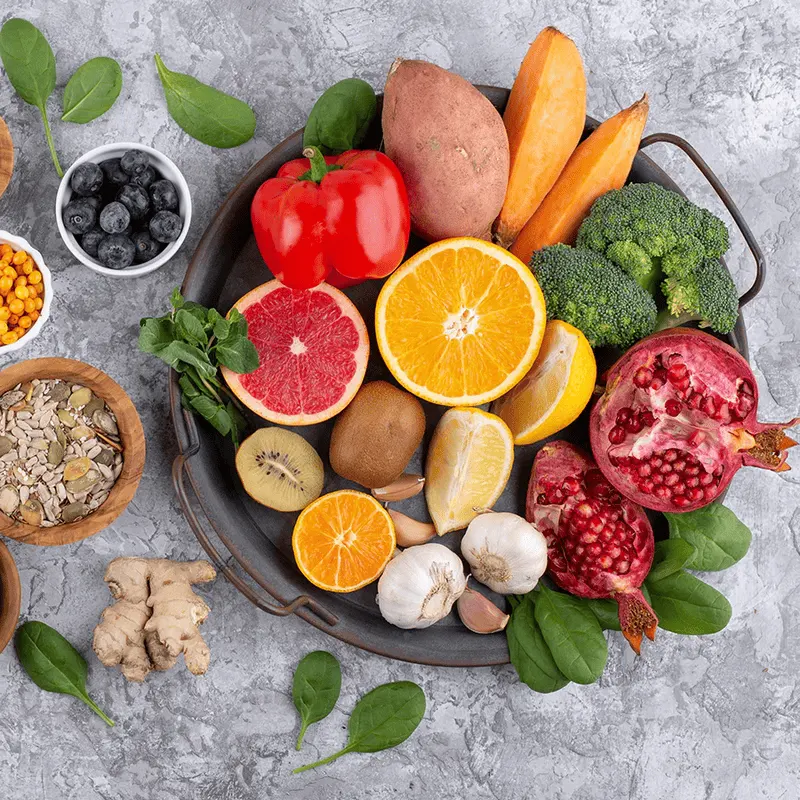Iron Essentials: Everything You Need to Know for Optimal Health

Iron is a key mineral to produce haemoglobin, a protein present in red blood cells that binds to oxygen and carries it to the body’s tissues. When the body doesn’t have enough iron, it can’t produce enough haemoglobin, which leads to iron deficiency anaemia. This produces iron deficiency symptoms such as fatigue, weakness, pale skin, and shortness of breath. This can occur due to a poor diet, blood loss, pregnancy, and other factors. The treatment typically involves iron supplements for energy and vitality, and dietary changes. It is important to know all about different iron-rich foods and their benefits, something we will cover extensively in this article.
Introduction
Imagine trying to run a marathon with a backpack filled with rocks. That’s how it feels when you have iron-deficiency anemia. Every step becomes a struggle as your body lacks the essential element required to produce haemoglobin – iron. Haemoglobin binds to and delivers oxygen to the cells all over the body. Iron-deficiency anemia is a common condition, particularly in women, and can cause fatigue, weakness, shortness of breath, and pale skin. But don’t worry! With timely diagnosis, proper supplementation like Feroglobin B12 capsules, and lifestyle changes, you can get back to feeling your energetic self. But before we discuss iron-rich foods and their benefits, let’s understand how exactly iron works its magic in our body.
Iron Metabolism and Action
Iron plays a crucial role in the synthesis of haemoglobin. The cells lining the digestive tract absorb iron from the food we consume, but only a small fraction of it is assimilated into the body. Once absorbed, iron enters the bloodstream, where it binds to a protein called transferrin. Transferrin carries it to the liver for storing it as ferritin. When the body requires iron to create new red blood cells in the bone marrow, the liver releases ferritin. Once red blood cells are no longer functional, after approximately 120 days, thespleen re-absorbs them, and the body recycles their iron content.
In addition to its role in the formation of haemoglobin, iron is also a constituent of myoglobin, a protein that transports and reserves oxygen in muscle tissue. Iron is crucial for the growth and development of brain in children and essential for the production and functioning of diverse cells and hormones.
Dietary iron is found in nature in two varieties: heme and non-heme. Heme iron is exclusively present in animal-based foods such as meat, poultry, and seafood. Non-heme iron is obtained from plant-based sources such as whole grains, nuts, seeds, legumes, and leafy greens. Non-heme iron can also be found in animal-derived foods (as animals consume plant-based sources of non-heme iron) as well as fortified foods.
Our body stores iron in the form of ferritin in various organs, including the liver, spleen, muscle tissue, and bone marrow. Transferrin, a protein present in blood, binds to iron and distributes it throughout the body, therefore, iron deficiency causes many health problems.
Daily Requirements and Food Sources
To avoid symptoms of iron deficiency, you should know how much iron you actually need. For adults between the ages of 19-50, the recommended dietary allowance (RDA) of iron is 19 mg daily for men, 29 mg for women, 40 mg for pregnant women, and 23 mg for lactating women.
The body can absorb heme iron more efficiently than non-heme iron. However, several factors can influence the absorption of non-heme iron. The simultaneous consumption of non-heme iron with heme iron or vitamin C can improve its absorption. On the other hand, intake of bran fibre, high levels of calcium (particularly from supplements), and plant compounds such as phytates and tannins can decrease the absorption of non-heme iron.
The food sources of heme iron are:
- Beef
- Eggs
- Chicken liver
- Fishes like tuna, sardines, oysters, and mussels
The food sources of non-heme iron are:
- Spinach
- Lentils
- Potato with skin
- Beans
- Fortified breakfast cereals
- Nuts and seeds
When you can’t get your daily dose of iron from foods, it may show iron deficiency symptoms, then one Feroglobin B12 tablet a day can do the trick!
Iron in Pregnancy
Pregnant women are advised to take iron supplements throughout pregnancy and post-delivery too to fulfil the high iron requirement to support her health as well as that of the developing baby and avoid symptoms of iron deficiency. Inadequate intake of iron during pregnancy can increase the risk ofiron-deficiency anaemiain the mother and can result in low birth weight, premature birth, and decreased iron levels in the new-born. Further, insufficient iron intake during pregnancy may adversely affect brain development of the baby.
Iron is required for proper brain development in infants and toddlers. Iron deficiency causes delayed psychological development, lesser attention, and social withdrawal in infants and toddlers.
Iron also supports the immune system and protects the body in extreme weather conditions. Thus, throughout pregnancy, supplements such as Feroglobin B12 are advised to prevent dip in iron levels.
In summary, the treatment of iron-deficiency anemia and maintenance of healthy iron levels is extremely important for people in all age groups, be it children, adults, or the elderly. Phases such as pregnancy pose higher demands on iron levels, necessitating using iron supplements.
The world’s No. 1 multivitamin company, Vitabiotics has designed an Iron supplements for energy and vitality, called Feroglobin B12. Along with iron, it contains vitamin B6, B12, and vitamin C. Vitamin B6 and B12 reduce the risk of birth defects, and vitamin C aids in boosting iron absorption. Feroglobin B12 reduces tiredness and fatigue, and it does this by enhancing the production of healthy red blood cells and hemoglobin in your body. It also lowers the risk of developing iron deficiency symptoms.
As a mother, you need to ensure that you remain healthy so you can raise a healthy baby. Take the first step towards your good health by ordering your pack of Vitabiotics iron supplements, Feroglobin B12 today!
Categories
- Beauty, Hair, Skin (18)
- Kids-Teens Health (3)
- Men's Health (11)
- Mind-Body (58)
- News-Research (9)
- Women's Health (20)










